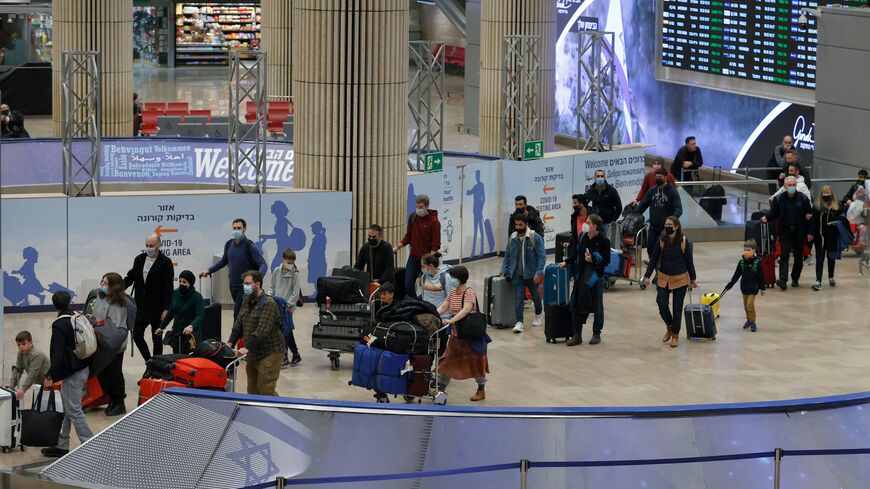TEL AVIV — A senior delegation from the US Department of Homeland Security (DHS), headed by Principal Deputy Assistant Secretary For International Affairs Robert Paschall, visited Israel last week to discuss advancing Israel's entry into the US visa-waiver program.
The American delegation also included DHS policy analyst Katherine Andrews and the Consul General at the US embassy in Jerusalem Andrew Miller. They held talks with their Israeli counterparts in Jerusalem on Wednesday and Thursday.
The visit comes after US Secretary of Homeland Security Alejandro Mayorkas announced on Monday that Israel has reached the required visitor visa refusal rate required for joining the program. Less than 3 percent of Israelis requesting US entry visas for 2022 were refused, Israel notified the US Homeland Security department.
The lower rate is one more step towards the elusive goal of allowing Israeli citizens to visit the US without applying for a visa. For several years, Israeli politicians have stated that Israel was about to join the visa-waiver program, but there are still a few more steps to go. The ball is now in Prime Minister Benjamin Netanyahu’s court. There are still several other requirements Israel must fulfill on its way to the waiver program.
In a video, US ambassador to Israel Tom Nides hailed the progress:
Important progress on the visa waiver program - watch this video for more information. For U.S. passports, “Blue is blue.” pic.twitter.com/1FqaJu5b7D
— Ambassador Tom Nides (@USAmbIsrael) January 30, 2023
The positive announcement on the low refusal rate was made just a few hours before Secretary of State Anthony Blinken landed in Israel. Foreign Minister Eli Cohen was quick to congratulate President Joe Biden for his support on the issue expressed last year, in Biden’s meeting with then-Prime Minister Naftali Bennett.
That being said, the remaining conditions for Israel joining the program won’t be easy, especially not for the Netanyahu government.
Under one condition, Israel will be required to provide similar treatment to all American citizens, regardless of their ethnic or religious background. In practice, this means that Israel will be obligated to allow any American of Arab descent, including Palestinians, to board a plane to Ben Gurion Airport and use their American passport to visit family in the West Bank.
Another condition is legislation to allow sharing some information on visa applicants with the US. The Knesset must expedite the passage of three relevant laws, no later than September 2023. Should it fail to do this, it will have missed the opportunity and will need to wait until next year at least.
When the previous government was in office, the opposition headed by Netanyahu delayed this legislation, claiming that it would invade personal privacy. Apparently, this was a political maneuver intended to prevent the Bennett-Lapid government from a popular achievement, even among supporters of the right.
The condition has not changed since then. The same legislation was demanded from all 40 countries that received visa exemptions. It now looks like Netanyahu himself will lead the speedy legislative process, so that he can list it as his achievement — something he needs for many different reasons.
US citizens are not required to ask for a visa ahead of arrival to Israel. On the other hand, millions of Israelis must undergo a long and expensive process lasting many months before they can obtain a visa to the US. As such, any prime minister would be proud of obtaining an exemption.
This is especially true of Netanyahu, who is facing a burgeoning protest movement amid claims that his policies are endangering Israeli democracy. At a cabinet meeting last month, Netanyahu expressed his commitment to achieve the visa-waiver goal. He even said it would encourage the immigration to Israel of US Jews. Shortly after the announcement, Netanyahu nominated National Security Adviser Tzachi Hanegbi to lead the file.
FM Cohen says #Israel will take "all the necessary measures, including legislation" to meet the requirements for inclusion in the US Visa Waiver Program. pic.twitter.com/AsrAt6rE4A
— Elizabeth Hagedorn (@ElizHagedorn) January 30, 2023
The government will have to act quickly, to change security measures in place for many years. Palestinians who live in the US and hold US citizenship often find it difficult to visit relatives in the West Bank. Frequently, they would need to enter West Bank territories through the Alenby Bridge on the border with Jordan, instead of arriving to the Ben Gurion airport and simply traveling by car directly to the West Bank. Israeli Arabs who are also American nationals have complained repeatedly over the years about their difficulties at the Ben Gurion airport.
Up until the Washington announcement on Tuesday, Netanyahu's far-right coalition did not stand in his way to accelerate preparations for the program. Still, that might change. According to public broadcaster KAN, National Security Minister Itamar Ben-Gvir expressed Tuesday night some reservations, saying that the police cannot give its approval to new security regulations at the airport until he himself has studied the issue thoroughly.
The US administration made it clear that Israel must fulfill the legislation and airport regulations by end of September. Failure to do so would push the Israeli request by a year, which means that Israel will have again to succeed keeping its visa-refusal rate under 3 percent also for 2023. Judging by the statements of Netanyahu and Cohen, Israel will maximize its efforts to conclude the required procedures on time.








